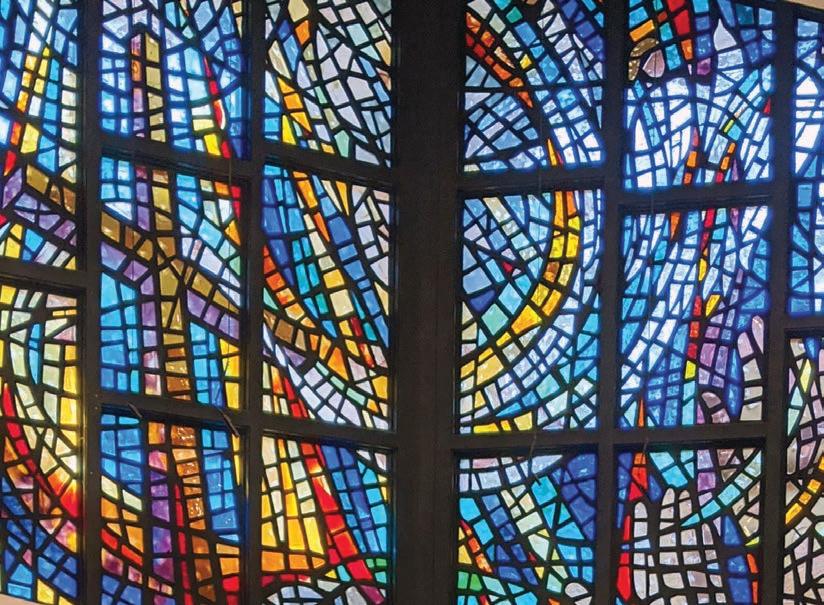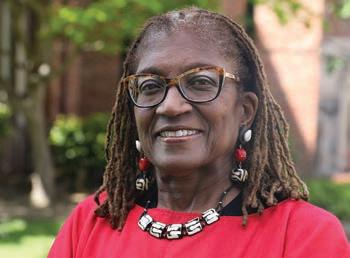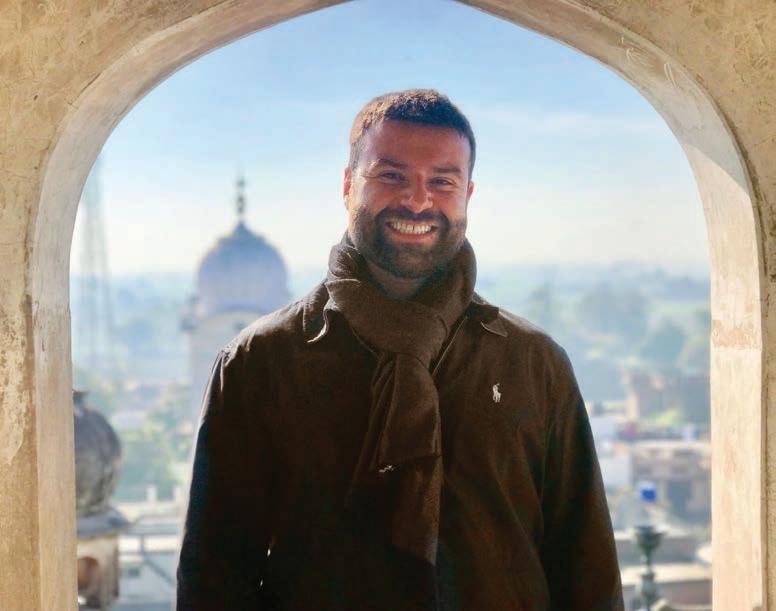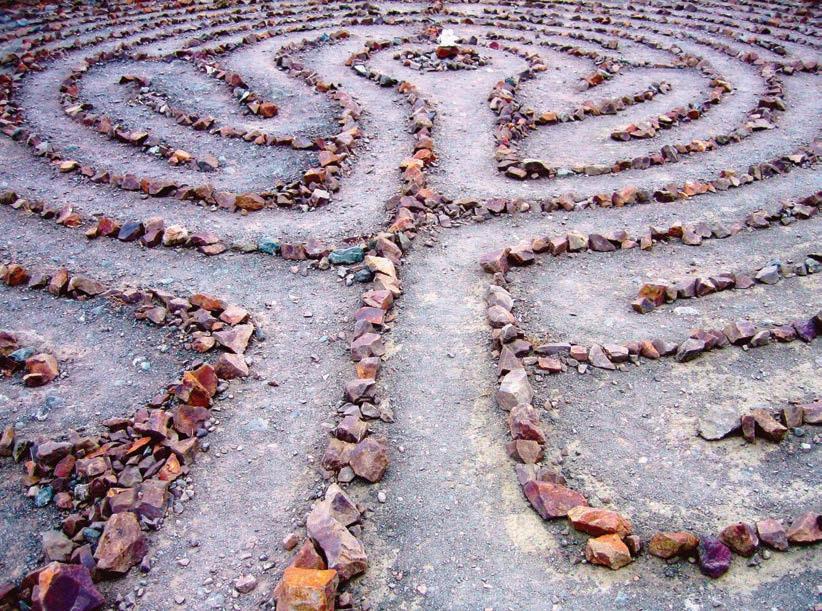
10 minute read
GTU News & Views
NEW FACULTY Q&A Sam Berrin Shonkoff
Sam Berrin Shonkoff, an assistant professor of Jewish studies and core doctoral faculty, joined the GTU in fall of 2019 — a welcome return to his hometown of Berkeley. He received a PhD in history of Judaism from the University of Chicago Divinity School and an MA in religion and Jewish studies from the University of Toronto. What drew you to religious education? I cannot remember a time when I was not inspired by the stuff of spirituality, from my childhood enchantments with the sights, sounds, and smells of Jewish rituals, to my adult reflections on religious ideas. In my twenties, an incredible amount came into focus: There were inspiring travels, texts, and teachers; that fecund year of living and learning in Jerusalem — and yes, Burning Man.
Throughout, I was both a participant and an observer — moved deeply by the experiences themselves as irreducible events, yet also moved to think about them from all possible perspectives. Once I truly realized that this dual awareness is simply a part of who I am, I chose to pursue a PhD in Jewish Studies rather than rabbinical ordination.
At the heart of all of this, there was a core question that led me to theological scholarship: What does it mean to be spiritually awake and responsive in this life, here and now, between birth and death? I no longer search for tidy answer, but the question itself will always fascinate me.
Talk about Martin Buber and your other scholarship. From the moment I first read Buber’s works as an undergraduate, I was drawn to his unequivocal stance that there is nothing more sacred or divine than one’s relationships in the world. There is simply no split in Buber’s thought between spirituality and ethics, religious
Photo courtesy of Sam Berrin Shonkoff “What does it mean to be spiritually awake and responsive in this life, here and now, between birth and death?”
concerns and social realities. And when these do diverge, we are in trouble.
My primary areas of scholarship are German-Jewish thought, Hasidism, and Neo-Hasidism — how relatively secular, non-Hasidic Jews have drawn upon Hasidism to envision new forms of spiritual-cultural renewal.
It is also noteworthy that I do theology. There is actually no academic program in Jewish theology anywhere in the country. Launching this will be one of
my contributions to the GTU. Students in this program will not only study the history of Jewish thought; they will also generate new Jewish thought. The time is ripe for this, given the great questions and challenges of the present age.
Thoughts about your first year? I have marveled at how the GTU combines top-notch academic studies of religion with genuine spiritual care and concerns. This potent combination is hard to find in individual scholars, let alone institutions. But I see it every day here, among students and faculty alike. There is a commitment to asking the most critical and challenging questions, while also staying in touch with a raw humility and fascination before these complex traditions. These are ideal conditions not only for intellectual productivity, but for intellectual community and spiritual growth.
New Student Fellowships Engage Community
The GTU is proud to introduce a new program of community-based partnerships: Experiential Learning Fellowships. Modeled on a successful pilot project that was a collaboration with Our Savior’s Lutheran Church in Lafayette, California, the new fellowships match GTU students’ expertise with the needs of local organizations to create and deliver site-specific projects.
“These are opportunities for our students to apply their knowledge in a realworld setting,” says Chaitanya “Chai” Motupalli, the director of student life, who is developing and implementing the program. That includes expanding fellowship opportunities by seeking out new community partners and interfacing with organizations who are interested in creating fellowship opportunities.
“Experiential Learning Fellowships enable the GTU to continue our commitment for translating scholarship into solutions,” Motupalli says. Student benefit is twofold. The program provides opportunities for
Valerie Miles-Tribble, DMin, PhD, describes the impetus for her new book Change Agent Church in Black
Lives Matter Times: Urgency For Action (Lexington Books/Fortress Academic) as the 2014 Ferguson, Missouri, murder of teenager Michael Brown at the hands of police and the “series of assaults on
Black and Brown bodies” that followed.
“I was troubled by the limited public presence of pastors and interfaith leaders, with the exception of a few that traveled to Ferguson, because only a few appealed to a moral theological consciousness against the injustice,” says Miles-Tribble, an associate professor of ministerial leadership and practical theology at the Berkeley
School of Theology (formerly the
American Baptist Seminary of the West), a member of the GTU consortium.
Stained Glass window behind the altar at Our Savior’s Lutheran Church in Lafayette, California, home to a pilot project that was a model for the new Experiential Fellowship Program. Photo courtesy of Our Savior’s Lutheran Church students to go outside the academy and engage with communities, and it provides platforms to bring student research to a wider audience. “This engagement beyond the classroom will help sharpen our Photo courtesy of Valerie Miles-Tribble She offers an academic and pastoral perspective to raise awareness of “religious and ideological differences impacting justice issues,” and, she says, to encourage Christian pastors “to integrate public witness into their vocational roles of justice leadership.” The book opens by asking, “Where’s the Church?” because, in a time of students’ approach to the academic work they are pursuing at the GTU, while also providing them with financial support for

New Book Explores the Church’s Role in Activism

their academic endeavors,” Motupalli says. extraordinary discord in America, the often-debated question “epitomizes shared dilemmas and frustration about effective public justice roles for religious communities in society,” Miles-Tribble says. The question has become even more relevant “amid the dual pandemics of COVID-19 and virulent racism,” she adds.
The 477-page tome includes biblical text, group process models, and leadership tools to prepare pastors and interfaith leaders who might be reluctant to act as “moral advocates.” “The book constitutes a rallying call to action for leaders and congregants to mobilize as change agents with increased commitment to public justice roles,” Miles-Tribble says. “Praxis is approached here as an embodied theology.”
AFTER THE GTU Mauricio Najarro
Within two months of defending his dissertation, Mauricio Najarro, PhD ’19, took qualifying exams for the joint UC Berkeley-UCSF Medical Anthropology program, which explores relationships between health and culture. Jumping right into a second PhD might seem daunting, but Najarro feels called to have religion and medicine inform each other more meaningfully.
Najarro’s GTU research initially explored addiction recovery as “liberation theology,” and later, the spirituality of everyday life. “I talked about what it meant for people to experience different kinds of freedoms, to become aware of the structures in their life that limit possibilities for freedom and for flourishing,” he says.
But he needed more tools. He says the standard addiction-recovery thinking defines people as “broken, and testifying to this brokenness is supposed to magically make things better. That’s not actually what happens,” he adds, noting that he’s in recovery himself. “The process is stigmatizing.”
In medical anthropology, he found a subtler, “desire-based” approach. “You ask people what they want, how they live, what their struggles are, what they need,” Najarro explains. “It’s a way of recognizing people’s agency, and the complexity of the struggles they face.” The method helps reveal “how people change what they desire — what’s worth wanting and what’s not worth wanting.”
The answers have religious undertones. Whether people are Christians, Sikhs, or Hindus, he says, “religion is the language that people use to talk about how a heart changes.”
The GTU helped him think critically about the conversations people from different religious traditions are having. But, he says, “I study what people do — an embodied, lived spirituality.”
Photo courtesy of Mauricio Najarro
He’s currently conducting field work on the opioid epidemic in Punjab, a northern Indian state bordering Pakistan.
“Where there are borderlands, there are drugs,” he notes.
As a Latino and a Catholic choosing research in India, Najarro is also mindful about “decolonizing” certain intellectual realms. Having few people of color working in areas outside “their own,” he says, “plays into this idea that only whiteness can travel across all borders, and everyone else is destined to only tell the story of their own people. I

want Latino kids studying India. I want Black kids studying India, I want people studying places out of curiosity — not out of the sense of, ‘they got my culture wrong,’” he says.
Pursuing his larger vision is a deep dive. He’ll stay in Punjab until August 2021, if the pandemic doesn’t upend his plans.
At his core, Najarro is a teacher. He wants to use his dual health and religious expertise to train future doctors, theologians, and pastors — “ideally in the same room,” he says, perhaps as a professor at a university with both divinity and medical schools. The merger of UCSF and Dignity Health did not go forward, but it exemplifies the sorts of questions he tackles. “What makes a health institution Catholic?” he asks. “What does it mean to have a Catholic education in bioethics?”
The larger question his work aims to answer is, “How do we have better conversations that take seriously the problems people have in their lives — and how they support each other to solve these problems?”
THE BIG QUESTION What is the role of spirituality and ethical leadership in the current times?
In response to the 2020 pandemic and California’s shelter-in-place order, in March, the GTU launched “Spiritual Care and Ethical Leadership for Our Times: Faith, Resilience, and Community in an Age of Uncertainty.” The series of written reflections and videos from scholars, spiritual leaders, and cultural critics from across the GTU brings a broad array of interreligious and interdisciplinary perspectives to questions central to the crisis.

“It’s natural to feel anxious and afraid in times of crisis,” then-Interim President Uriah Kim said in his essay introducing the series. “But it’s also in times like these that the remarkable resilience of the human spirit can be fully displayed.” He adds, “Amid this outbreak, we have extraordinary opportunities to care for one another, to advocate for the most vulnerable, and to live out the spirits of justice and compassion that are central to so many faith traditions — and at the heart of the mission of the GTU.”
Go to www.gtu.edu/projects/scel to explore the series.
Dr. Kathryn Barush’s reflection and video “A Pilgrimage in Place” explores how the ancient practice of tracing a labyrinth, like this one at Land’s End in San Francisco, can, she says, “help us find a moment of peace and solace” in difficult times. Photo: Jack Dorsey, creativecommons.org/licenses/by/2.0/
William D. Glenn Appointed New Board Chair
On June 1, William D. Glenn of Santa world,” said outgoing Board Chair Susan Rosa, California, began a two-year Cook Hoganson. Glenn brings a “deep appointment to the seated integrity, wisdom, and wealth of role of Chair of the experiences” to the role, she said. Board of Trustees. Glenn, a graduate A deeply involved member of the larger of the University Bay Area community for over 40 years, of San Francisco Glenn, a clinical psychologist in private and Pacific School practice, has engaged with arts and of Religion, has culture, advanced causes impacting the served on the LGBTQ community, supported resilience GTU’s Board of among incarcerated populations at Trustees since 2013. His wide-ranging the San Quentin State Penitentiary. and robust service has drawn on He also spent nine years as a senior expertise in fundraising, administration, administrative leader at Mercy High and advocacy. School of San Francisco. The numerous local organizations he’s served include “[The GTU] is a constantly changing KQED’s Board of Directors, PSR’s organism within a constantly changing National Advisory Board for the Center for Lesbian and Gay Studies in Ministry and Religion, and the San Francisco AIDS Foundation. He received PSR’s Award for Distinguished Preaching, as well as the Founders Award, which he shared with his husband, Scott Hafner, a former PSR board chair.
Speaking about his leadership vision, Glenn said, “The GTU is sacred ground on which we meet, peopled by quite remarkable individuals who believe in the idea of the magis, that is, the greater good — and are not satisfied with the collective culture’s notion of the good, but always strive for more.” He adds that it’s work “for which the world has great need — perhaps now, more than ever."









